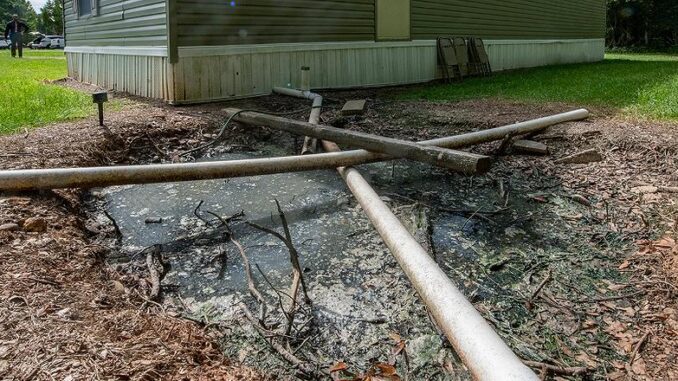
MONTGOMERY, Alabama, May 19, 2024 (ENS) – The U.S. Justice Department and the Department of Health and Human Services, HHS, are proclaiming progress has been made by the Alabama Department of Public Health in providing access to basic sanitation services for the majority Black communities of Lowndes County, Alabama.
These basic services are intended to prevent exposure to raw sewage from inadequate onsite wastewater systems, and to provide better health outcomes than the current use of open-sewage systems allows.
For generations, hundreds of residents of Lowndes County have straight-piped wastewater into their yards or lived with broken septic tanks that cause raw sewage to back up into their homes when it rains.
The progress announcement comes one year after the Justice Department and HHS secured an interim resolution agreement with the Alabama Department of Public Health, ADPH, following its investigation into whether the Alabama agency, a recipient of federal funds, discriminated on the basis of race, color or national origin in failing to provide all residents of Lowndes County basic sanitation needs.
Such discrimination violates both the Civil Rights Act of 1964 and the Affordable Care Act.
“Advancing environmental justice is a top priority for the Justice Department,”Assistant Attorney General Kristen Clarke of the Justice Department’s Civil Rights Division said. “Through this agreement, the Justice Department and HHS are working rigorously to ensure that residents of Lowndes County can access basic sanitation needs.”
“For decades, Lowndes County residents have endured living without basic sanitation and wastewater disposal services. The disproportionate impact of this on Black, low-income, rural residents — who, for generations, have suffered through illness, infectious diseases and public health risks simply for living in their own neighborhoods – is unacceptable,” said Director Melanie Fontes Rainer of the HHS Office for Civil Rights.
“The work by HHS and the Justice Department here is significant in working with the State of Alabama. Today’s update shows the progress made by the state to address these issues. Environmental justice is critical for people across the country, and we will continue to fight to ensure that this community and others are is safe from environmental hazards,” Rainer said.
Close to the State Capital of Montgomery, Lowndes County, in central Alabama, was inhabited by 10,311 people as of the 2020 census. Historically it has been considered part of the Black Belt, known for its fertile soil, cotton plantations, and a high number of African American workers, enslaved and later freed, Wikipedia recounts.
By 1960, the population of about 15,000 residents was about 80 percent Black. The rural county was called “Bloody Lowndes,” because of the high rate of white violence against blacks to maintain segregation.
In 1965, a century after the American Civil War and decades after whites had disenfranchised blacks via the 1901 state constitution, white supremacists in Lowndes County suppressed black voting efforts by intimidation and violence.
The ongoing struggle for health and equality is now being played out in the Lowndes Country sewage management system.
To illustrate the severity of the issue, a 2017 study from researchers at the National School of Tropical Medicine, Baylor College of Medicine in Houston, Texas, and the Alabama Center for Rural Enterprise in Montgomery entitled, “Human Intestinal Parasite Burden and Poor Sanitation in Rural Alabama,” compares the sanitation in Lowndes County to that of the world’s poorest countries.
Both locations offer digestive parasitic hookworms the environment they need to grow – the use of open-sewage systems.
“Hookworm infection affects 430 million people worldwide, causing iron deficiency, impaired cognitive development, and stunting in children,” the Baylor study’s authors state. “Because of the environmental conditions needed for the hookworm life-cycle, this parasite is endemic to resource-limited countries.”
The species of hookworm Necator americanus was endemic in the southern United States before improvement of sewage disposal systems and eradication programs,” they write.
Because of its “previous high hookworm burdens, degree of poverty, and use of open-sewage systems,” the Baylor scientists selected Lowndes County with its “continued poverty, poor sanitation, and an environment suitable for the hookworm life-cycle” as the best location for their current prevalence study using modern molecular diagnostics.
They found that gastrointestinal parasites are present in more than 30 percent of this at-risk population in Lowndes County.
Solutions have seemed tantalizingly close, only to be lost. In July 2021, the county won a $2 million U.S. Dept. of Agriculture grant to install modern sewage management infrastructure. But the county could not come up with the 25 percent funding match due to a political hassle, and so the grant was recinded.
Now, this month, the Alabama Department of Public Health won the approval of the U.S. Justice Department and Dept. of Health and Human Services for taking action to advance sustainable and equitable solutions for onsite wastewater management for Lowndes County residents. The state agency has:
- Selected the first set of residences whose wastewater systems will be installed or repaired for free via a local, not-for-profit entity that will manage ADPH’s Lowndes County Septic System Improvement Program;
- Suspended criminal enforcement of state sanitation laws in Lowndes County against residents without the means to purchase functioning, ADPH-permitted septic systems;
- Conducted a public health information campaign, including the development and dissemination of flyers concerning the health risks associated with exposure to raw sewage, how to mitigate exposure to raw sewage and proper septic system maintenance;
- Created and filled a Lowndes County Community Liaison position and an outreach/grant manager position for Lowndes County and Black Belt communities to oversee implementation of ADPH’s Public Health and Infrastructure Improvement Plan (PHIIP); and
- Submitted the PHIIP, which sets forth plans to avert future public health risks and implement sanitation solutions for the community.
The Alabama Department of Public Health has also launched its Environmental Health Assessment to identify and prioritize residences for septic system installations or repairs based on data analysis of which homes face the most serious environmental and health risks from exposure to raw sewage.
The assessment will help officials decide whether a home needs a new septic system by taking into account the location of raw sewage on the property, how often raw sewage backs up into the home being assessed, and the ages and medical conditions of people living there.
ADPH encourages Lowndes County residents who are required to use onsite septic systems for wastewater management to complete the Assessment. Residents can go to this site: epiweb.adph.state.al.us/redcap/surveys/?s=xamaxkhdrxxxldle to access the Assessment. [Editor’s Note: Active links to this survey for non-residents of Lowndes County are not allowed.]
More information on ADPH’s septic system installation program is available here, or by contacting ADPH at (334) 206-5371 or by clicking here.
ADPH pledges not to use the information collected by the Assessment for any other purposes, including issuing citations for alleged violation of sanitation laws.
The Justice Dept.’s Civil Rights Division’s Federal Coordination and Compliance Section and the HHS Office for Civil Rights conducted this investigation jointly with the support of the U.S. Attorney’s Office for the Middle District of Alabama.
Individuals who believe their civil rights have been violated can file a complaint with the Civil Rights Division at: www.civilrights.justice.gov/report/. Additional information about the HHS Office for Civil Rights is available at: www.hhs.gov/ocr. If you believe that you or someone else has been discriminated against in programs or activities that HHS directly operates or to which HHS provides federal financial assistance, you may file a complaint at ocrportal.hhs.gov/.
According to the American Society of Civil Engineers, more than two million people in the United States live without access to adequate wastewater infrastructure – a clear threat to public health. To address this situation, the U.S. EPA and the U.S. Dept. of Agriculture jointly launched a pilot project in August 2022 to provide sanitation services in 11 rural communities across the country, in part using funds from the $1.2 trillion Infrastructure Investment and Jobs Act passed in 2021. The project aims to address unmet sanitation needs in rural areas throughout the United States.
Featured image: Raw sewage empties from a straight pipe directly into the backyard of this home in Lowndes County, Alabama. (By Lance Cheung courtesy U.S. Dept. of Agriculture)



